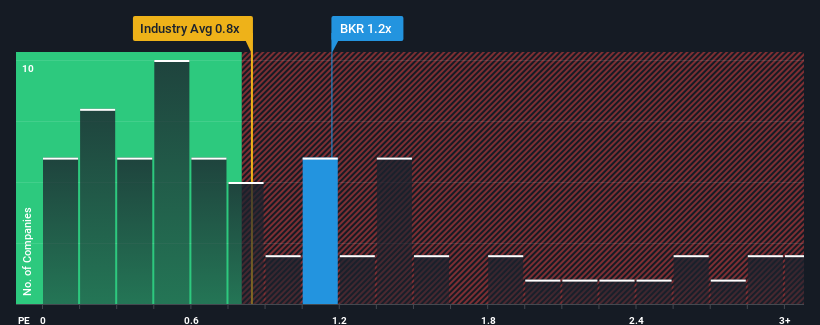- United States
- /
- Energy Services
- /
- NasdaqGS:BKR
Baker Hughes Company (NASDAQ:BKR) Investors Are Less Pessimistic Than Expected

It's not a stretch to say that Baker Hughes Company's (NASDAQ:BKR) price-to-sales (or "P/S") ratio of 1.2x right now seems quite "middle-of-the-road" for companies in the Energy Services industry in the United States, where the median P/S ratio is around 0.8x. However, investors might be overlooking a clear opportunity or potential setback if there is no rational basis for the P/S.
View our latest analysis for Baker Hughes

What Does Baker Hughes' P/S Mean For Shareholders?
Recent revenue growth for Baker Hughes has been in line with the industry. It seems that many are expecting the mediocre revenue performance to persist, which has held the P/S ratio back. If you like the company, you'd be hoping this can at least be maintained so that you could pick up some stock while it's not quite in favour.
Want the full picture on analyst estimates for the company? Then our free report on Baker Hughes will help you uncover what's on the horizon.How Is Baker Hughes' Revenue Growth Trending?
Baker Hughes' P/S ratio would be typical for a company that's only expected to deliver moderate growth, and importantly, perform in line with the industry.
If we review the last year of revenue growth, the company posted a terrific increase of 21%. Revenue has also lifted 23% in aggregate from three years ago, mostly thanks to the last 12 months of growth. Accordingly, shareholders would have probably been satisfied with the medium-term rates of revenue growth.
Looking ahead now, revenue is anticipated to climb by 6.5% per year during the coming three years according to the analysts following the company. Meanwhile, the rest of the industry is forecast to expand by 8.8% per year, which is noticeably more attractive.
In light of this, it's curious that Baker Hughes' P/S sits in line with the majority of other companies. Apparently many investors in the company are less bearish than analysts indicate and aren't willing to let go of their stock right now. Maintaining these prices will be difficult to achieve as this level of revenue growth is likely to weigh down the shares eventually.
The Bottom Line On Baker Hughes' P/S
Generally, our preference is to limit the use of the price-to-sales ratio to establishing what the market thinks about the overall health of a company.
Given that Baker Hughes' revenue growth projections are relatively subdued in comparison to the wider industry, it comes as a surprise to see it trading at its current P/S ratio. When we see companies with a relatively weaker revenue outlook compared to the industry, we suspect the share price is at risk of declining, sending the moderate P/S lower. A positive change is needed in order to justify the current price-to-sales ratio.
There are also other vital risk factors to consider before investing and we've discovered 1 warning sign for Baker Hughes that you should be aware of.
Of course, profitable companies with a history of great earnings growth are generally safer bets. So you may wish to see this free collection of other companies that have reasonable P/E ratios and have grown earnings strongly.
Valuation is complex, but we're here to simplify it.
Discover if Baker Hughes might be undervalued or overvalued with our detailed analysis, featuring fair value estimates, potential risks, dividends, insider trades, and its financial condition.
Access Free AnalysisHave feedback on this article? Concerned about the content? Get in touch with us directly. Alternatively, email editorial-team (at) simplywallst.com.
This article by Simply Wall St is general in nature. We provide commentary based on historical data and analyst forecasts only using an unbiased methodology and our articles are not intended to be financial advice. It does not constitute a recommendation to buy or sell any stock, and does not take account of your objectives, or your financial situation. We aim to bring you long-term focused analysis driven by fundamental data. Note that our analysis may not factor in the latest price-sensitive company announcements or qualitative material. Simply Wall St has no position in any stocks mentioned.
About NasdaqGS:BKR
Baker Hughes
Provides a portfolio of technologies and services to energy and industrial value chain worldwide.
Excellent balance sheet with proven track record.
Similar Companies
Market Insights
Community Narratives




